- Home
- Jack London
Love of Life, and Other Stories Page 4
Love of Life, and Other Stories Read online
Page 4
THE STORY OF KEESH
Keesh lived long ago on the rim of the polar sea, was head man of hisvillage through many and prosperous years, and died full of honors withhis name on the lips of men. So long ago did he live that only the oldmen remember his name, his name and the tale, which they got from the oldmen before them, and which the old men to come will tell to theirchildren and their children's children down to the end of time. And thewinter darkness, when the north gales make their long sweep across theice-pack, and the air is filled with flying white, and no man may ventureforth, is the chosen time for the telling of how Keesh, from the poorest_igloo_ in the village, rose to power and place over them all.
He was a bright boy, so the tale runs, healthy and strong, and he hadseen thirteen suns, in their way of reckoning time. For each winter thesun leaves the land in darkness, and the next year a new sun returns sothat they may be warm again and look upon one another's faces. Thefather of Keesh had been a very brave man, but he had met his death in atime of famine, when he sought to save the lives of his people by takingthe life of a great polar bear. In his eagerness he came to closegrapples with the bear, and his bones were crushed; but the bear had muchmeat on him and the people were saved. Keesh was his only son, and afterthat Keesh lived alone with his mother. But the people are prone toforget, and they forgot the deed of his father; and he being but a boy,and his mother only a woman, they, too, were swiftly forgotten, and erelong came to live in the meanest of all the _igloos_.
It was at a council, one night, in the big _igloo_ of Klosh-Kwan, thechief, that Keesh showed the blood that ran in his veins and the manhoodthat stiffened his back. With the dignity of an elder, he rose to hisfeet, and waited for silence amid the babble of voices.
"It is true that meat be apportioned me and mine," he said. "But it isofttimes old and tough, this meat, and, moreover, it has an unusualquantity of bones."
The hunters, grizzled and gray, and lusty and young, were aghast. Thelike had never been known before. A child, that talked like a grown man,and said harsh things to their very faces!
But steadily and with seriousness, Keesh went on. "For that I know myfather, Bok, was a great hunter, I speak these words. It is said thatBok brought home more meat than any of the two best hunters, that withhis own hands he attended to the division of it, that with his own eyeshe saw to it that the least old woman and the last old man received fairshare."
"Na! Na!" the men cried. "Put the child out!" "Send him off to bed!""He is no man that he should talk to men and graybeards!"
He waited calmly till the uproar died down.
"Thou hast a wife, Ugh-Gluk," he said, "and for her dost thou speak. Andthou, too, Massuk, a mother also, and for them dost thou speak. Mymother has no one, save me; wherefore I speak. As I say, though Bok bedead because he hunted over-keenly, it is just that I, who am his son,and that Ikeega, who is my mother and was his wife, should have meat inplenty so long as there be meat in plenty in the tribe. I, Keesh, theson of Bok, have spoken."
He sat down, his ears keenly alert to the flood of protest andindignation his words had created.
"That a boy should speak in council!" old Ugh-Gluk was mumbling.
"Shall the babes in arms tell us men the things we shall do?" Massukdemanded in a loud voice. "Am I a man that I should be made a mock byevery child that cries for meat?"
The anger boiled a white heat. They ordered him to bed, threatened thathe should have no meat at all, and promised him sore beatings for hispresumption. Keesh's eyes began to flash, and the blood to pound darklyunder his skin. In the midst of the abuse he sprang to his feet.
"Hear me, ye men!" he cried. "Never shall I speak in the council again,never again till the men come to me and say, 'It is well, Keesh, thatthou shouldst speak, it is well and it is our wish.' Take this now, yemen, for my last word. Bok, my father, was a great hunter. I, too, hisson, shall go and hunt the meat that I eat. And be it known, now, thatthe division of that which I kill shall be fair. And no widow nor weakone shall cry in the night because there is no meat, when the strong menare groaning in great pain for that they have eaten overmuch. And in thedays to come there shall be shame upon the strong men who have eatenovermuch. I, Keesh, have said it!"
Jeers and scornful laughter followed him out of the _igloo_, but his jawwas set and he went his way, looking neither to right nor left.
The next day he went forth along the shore-line where the ice and theland met together. Those who saw him go noted that he carried his bow,with a goodly supply of bone-barbed arrows, and that across his shoulderwas his father's big hunting-spear. And there was laughter, and muchtalk, at the event. It was an unprecedented occurrence. Never did boysof his tender age go forth to hunt, much less to hunt alone. Also werethere shaking of heads and prophetic mutterings, and the women lookedpityingly at Ikeega, and her face was grave and sad.
"He will be back ere long," they said cheeringly.
"Let him go; it will teach him a lesson," the hunters said. "And he willcome back shortly, and he will be meek and soft of speech in the days tofollow."
But a day passed, and a second, and on the third a wild gale blew, andthere was no Keesh. Ikeega tore her hair and put soot of the seal-oil onher face in token of her grief; and the women assailed the men withbitter words in that they had mistreated the boy and sent him to hisdeath; and the men made no answer, preparing to go in search of the bodywhen the storm abated.
Early next morning, however, Keesh strode into the village. But he camenot shamefacedly. Across his shoulders he bore a burden of fresh-killedmeat. And there was importance in his step and arrogance in his speech.
"Go, ye men, with the dogs and sledges, and take my trail for the betterpart of a day's travel," he said. "There is much meat on the ice--a she-bear and two half-grown cubs."
Ikeega was overcome with joy, but he received her demonstrations inmanlike fashion, saying: "Come, Ikeega, let us eat. And after that Ishall sleep, for I am weary."
And he passed into their _igloo_ and ate profoundly, and after that sleptfor twenty running hours.
There was much doubt at first, much doubt and discussion. The killing ofa polar bear is very dangerous, but thrice dangerous is it, and threetimes thrice, to kill a mother bear with her cubs. The men could notbring themselves to believe that the boy Keesh, single-handed, hadaccomplished so great a marvel. But the women spoke of the fresh-killedmeat he had brought on his back, and this was an overwhelming argumentagainst their unbelief. So they finally departed, grumbling greatly thatin all probability, if the thing were so, he had neglected to cut up thecarcasses. Now in the north it is very necessary that this should bedone as soon as a kill is made. If not, the meat freezes so solidly asto turn the edge of the sharpest knife, and a three-hundred-pound bear,frozen stiff, is no easy thing to put upon a sled and haul over the roughice. But arrived at the spot, they found not only the kill, which theyhad doubted, but that Keesh had quartered the beasts in true hunterfashion, and removed the entrails.
Thus began the mystery of Keesh, a mystery that deepened and deepenedwith the passing of the days. His very next trip he killed a young bear,nearly full-grown, and on the trip following, a large male bear and hismate. He was ordinarily gone from three to four days, though it wasnothing unusual for him to stay away a week at a time on the ice-field.Always he declined company on these expeditions, and the peoplemarvelled. "How does he do it?" they demanded of one another. "Neverdoes he take a dog with him, and dogs are of such great help, too."
"Why dost thou hunt only bear?" Klosh-Kwan once ventured to ask him.
And Keesh made fitting answer. "It is well known that there is more meaton the bear," he said.
But there was also talk of witchcraft in the village. "He hunts withevil spirits," some of the people contended, "wherefore his hunting isrewarded. How else can it be, save that he hunts with evil spirits?"
"Mayhap they be not evil, but good, these spirits," others said.
"It isknown that his father was a mighty hunter. May not his father hunt withhim so that he may attain excellence and patience and understanding? Whoknows?"
None the less, his success continued, and the less skilful hunters wereoften kept busy hauling in his meat. And in the division of it he wasjust. As his father had done before him, he saw to it that the least oldwoman and the last old man received a fair portion, keeping no more forhimself than his needs required. And because of this, and of his meritas a hunter, he was looked upon with respect, and even awe; and there wastalk of making him chief after old Klosh-Kwan. Because of the things hehad done, they looked for him to appear again in the council, but henever came, and they were ashamed to ask.
"I am minded to build me an _igloo_," he said one day to Klosh-Kwan and anumber of the hunters. "It shall be a large _igloo_, wherein Ikeega andI can dwell in comfort."
"Ay," they nodded gravely.
"But I have no time. My business is hunting, and it takes all my time.So it is but just that the men and women of the village who eat my meatshould build me my _igloo_."
And the _igloo_ was built accordingly, on a generous scale which exceededeven the dwelling of Klosh-Kwan. Keesh and his mother moved into it, andit was the first prosperity she had enjoyed since the death of Bok. Norwas material prosperity alone hers, for, because of her wonderful son andthe position he had given her, she came to be looked upon as the firstwoman in all the village; and the women were given to visiting her, toasking her advice, and to quoting her wisdom when arguments arose amongthemselves or with the men.
But it was the mystery of Keesh's marvellous hunting that took chiefplace in all their minds. And one day Ugh-Gluk taxed him with witchcraftto his face.
"It is charged," Ugh-Gluk said ominously, "that thou dealest with evilspirits, wherefore thy hunting is rewarded."
"Is not the meat good?" Keesh made answer. "Has one in the village yetto fall sick from the eating of it? How dost thou know that witchcraftbe concerned? Or dost thou guess, in the dark, merely because of theenvy that consumes thee?"
And Ugh-Gluk withdrew discomfited, the women laughing at him as he walkedaway. But in the council one night, after long deliberation, it wasdetermined to put spies on his track when he went forth to hunt, so thathis methods might be learned. So, on his next trip, Bim and Bawn, twoyoung men, and of hunters the craftiest, followed after him, taking carenot to be seen. After five days they returned, their eyes bulging andtheir tongues a-tremble to tell what they had seen. The council washastily called in Klosh-Kwan's dwelling, and Bim took up the tale.
"Brothers! As commanded, we journeyed on the trail of Keesh, andcunningly we journeyed, so that he might not know. And midway of thefirst day he picked up with a great he-bear. It was a very great bear."
"None greater," Bawn corroborated, and went on himself. "Yet was thebear not inclined to fight, for he turned away and made off slowly overthe ice. This we saw from the rocks of the shore, and the bear cametoward us, and after him came Keesh, very much unafraid. And he shoutedharsh words after the bear, and waved his arms about, and made muchnoise. Then did the bear grow angry, and rise up on his hind legs, andgrowl. But Keesh walked right up to the bear."
"Ay," Bim continued the story. "Right up to the bear Keesh walked. Andthe bear took after him, and Keesh ran away. But as he ran he dropped alittle round ball on the ice. And the bear stopped and smelled of it,then swallowed it up. And Keesh continued to run away and drop littleround balls, and the bear continued to swallow them up."
Exclamations and cries of doubt were being made, and Ugh-Gluk expressedopen unbelief.
"With our own eyes we saw it," Bim affirmed.
And Bawn--"Ay, with our own eyes. And this continued until the bearstood suddenly upright and cried aloud in pain, and thrashed his forepaws madly about. And Keesh continued to make off over the ice to a safedistance. But the bear gave him no notice, being occupied with themisfortune the little round balls had wrought within him."
"Ay, within him," Bim interrupted. "For he did claw at himself, and leapabout over the ice like a playful puppy, save from the way he growled andsquealed it was plain it was not play but pain. Never did I see such asight!"
"Nay, never was such a sight seen," Bawn took up the strain. "Andfurthermore, it was such a large bear."
"Witchcraft," Ugh-Gluk suggested.
"I know not," Bawn replied. "I tell only of what my eyes beheld. Andafter a while the bear grew weak and tired, for he was very heavy and hehad jumped about with exceeding violence, and he went off along the shore-ice, shaking his head slowly from side to side and sitting down ever andagain to squeal and cry. And Keesh followed after the bear, and wefollowed after Keesh, and for that day and three days more we followed.The bear grew weak, and never ceased crying from his pain."
"It was a charm!" Ugh-Gluk exclaimed. "Surely it was a charm!"
"It may well be."
And Bim relieved Bawn. "The bear wandered, now this way and now that,doubling back and forth and crossing his trail in circles, so that at theend he was near where Keesh had first come upon him. By this time he wasquite sick, the bear, and could crawl no farther, so Keesh came up closeand speared him to death."
"And then?" Klosh-Kwan demanded.
"Then we left Keesh skinning the bear, and came running that the news ofthe killing might be told."
And in the afternoon of that day the women hauled in the meat of the bearwhile the men sat in council assembled. When Keesh arrived a messengerwas sent to him, bidding him come to the council. But he sent reply,saying that he was hungry and tired; also that his _igloo_ was large andcomfortable and could hold many men.
And curiosity was so strong on the men that the whole council, Klosh-Kwanto the fore, rose up and went to the _igloo_ of Keesh. He was eating,but he received them with respect and seated them according to theirrank. Ikeega was proud and embarrassed by turns, but Keesh was quitecomposed.
Klosh-Kwan recited the information brought by Bim and Bawn, and at itsclose said in a stern voice: "So explanation is wanted, O Keesh, of thymanner of hunting. Is there witchcraft in it?"
Keesh looked up and smiled. "Nay, O Klosh-Kwan. It is not for a boy toknow aught of witches, and of witches I know nothing. I have but deviseda means whereby I may kill the ice-bear with ease, that is all. It beheadcraft, not witchcraft."
"And may any man?"
"Any man."
There was a long silence. The men looked in one another's faces, andKeesh went on eating.
"And . . . and . . . and wilt thou tell us, O Keesh?" Klosh-Kwan finallyasked in a tremulous voice.
"Yea, I will tell thee." Keesh finished sucking a marrow-bone and roseto his feet. "It is quite simple. Behold!"
He picked up a thin strip of whalebone and showed it to them. The endswere sharp as needle-points. The strip he coiled carefully, till itdisappeared in his hand. Then, suddenly releasing it, it sprang straightagain. He picked up a piece of blubber.
"So," he said, "one takes a small chunk of blubber, thus, and thus makesit hollow. Then into the hollow goes the whalebone, so, tightly coiled,and another piece of blubber is fitted over the whale-bone. After thatit is put outside where it freezes into a little round ball. The bearswallows the little round ball, the blubber melts, the whalebone with itssharp ends stands out straight, the bear gets sick, and when the bear isvery sick, why, you kill him with a spear. It is quite simple."
And Ugh-Gluk said "Oh!" and Klosh-Kwan said "Ah!" And each saidsomething after his own manner, and all understood.
And this is the story of Keesh, who lived long ago on the rim of thepolar sea. Because he exercised headcraft and not witchcraft, he rosefrom the meanest _igloo_ to be head man of his village, and through allthe years that he lived, it is related, his tribe was prosperous, andneither widow nor weak one cried aloud in the night because there was nomeat.

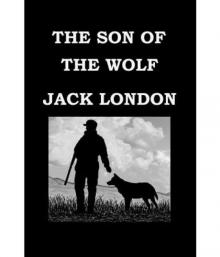 The Son of the Wolf
The Son of the Wolf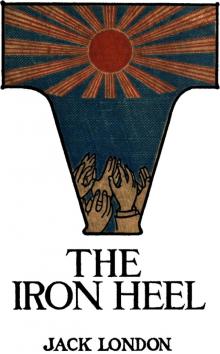 The Iron Heel
The Iron Heel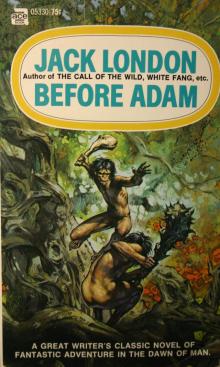 Before Adam
Before Adam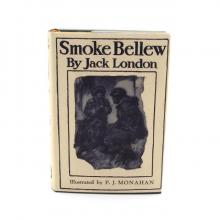 Smoke Bellew
Smoke Bellew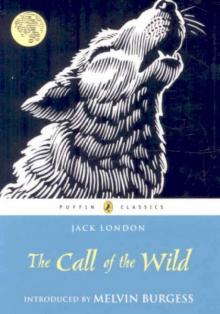 The Call of the Wild
The Call of the Wild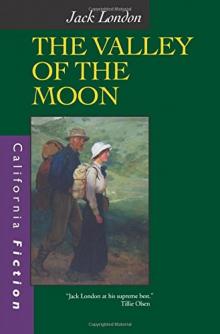 The Valley of the Moon Jack London
The Valley of the Moon Jack London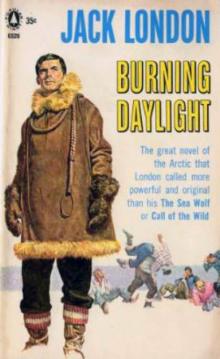 Burning Daylight
Burning Daylight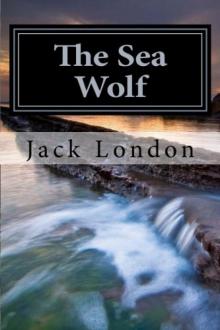 The Sea Wolf
The Sea Wolf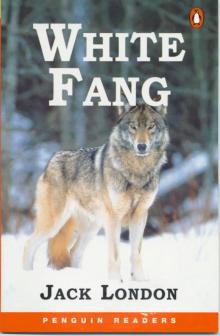 White Fang
White Fang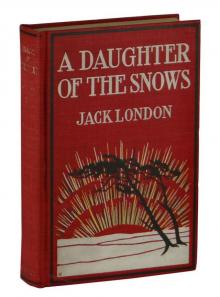 A Daughter of the Snows
A Daughter of the Snows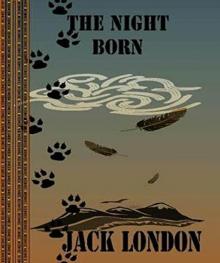 The Night-Born
The Night-Born A Son Of The Sun
A Son Of The Sun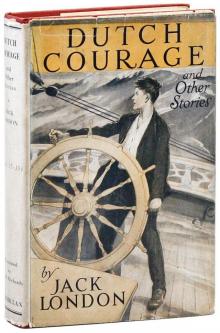 Dutch Courage and Other Stories
Dutch Courage and Other Stories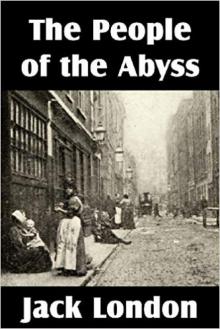 The People of the Abyss
The People of the Abyss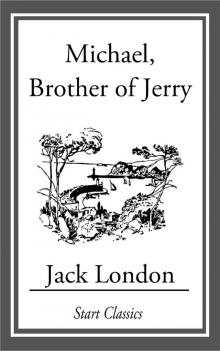 Michael, Brother of Jerry
Michael, Brother of Jerry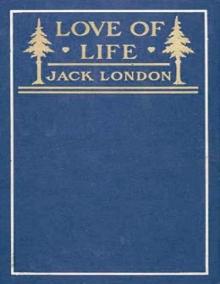 Love of Life, and Other Stories
Love of Life, and Other Stories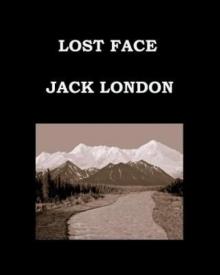 Lost Face
Lost Face The Road
The Road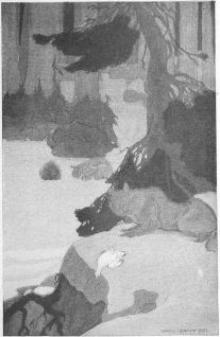 Love of Life
Love of Life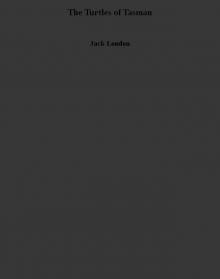 The Turtles of Tasman
The Turtles of Tasman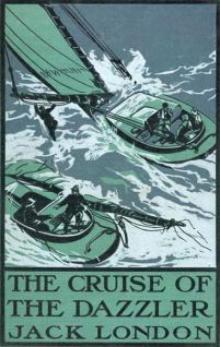 The Cruise of The Dazzler
The Cruise of The Dazzler The Heathen
The Heathen The Scab
The Scab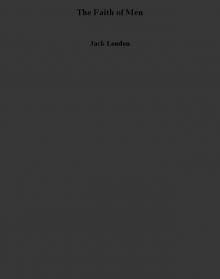 The Faith of Men
The Faith of Men Adventure
Adventure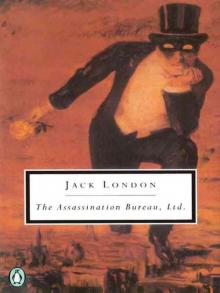 The Assassination Bureau, Ltd.
The Assassination Bureau, Ltd.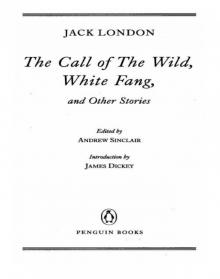 The Call of the Wild, White Fang, and Other Stories
The Call of the Wild, White Fang, and Other Stories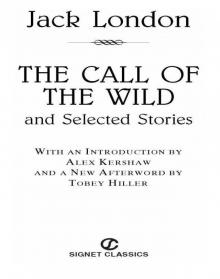 The Call of the Wild and Selected Stories
The Call of the Wild and Selected Stories Jerry of the Islands
Jerry of the Islands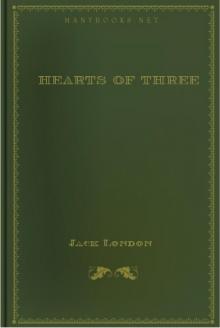 Hearts of Three
Hearts of Three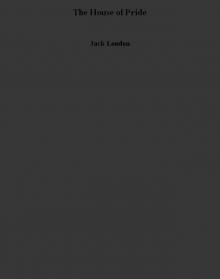 The House of Pride
The House of Pride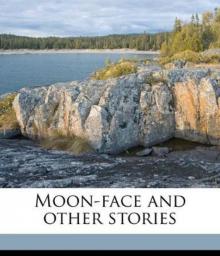 Moon-Face and Other Stories
Moon-Face and Other Stories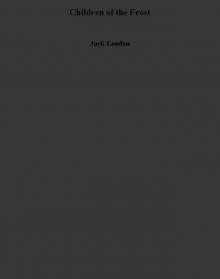 Children of the Frost
Children of the Frost South Sea Tales
South Sea Tales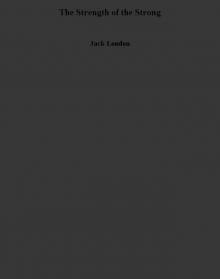 The Strength of the Strong
The Strength of the Strong The Jacket (The Star-Rover)
The Jacket (The Star-Rover)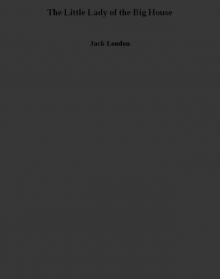 The Little Lady of the Big House
The Little Lady of the Big House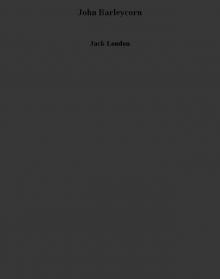 John Barleycorn
John Barleycorn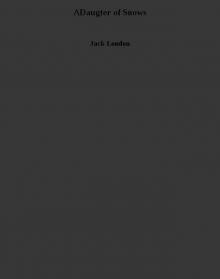 ADaugter of Snows
ADaugter of Snows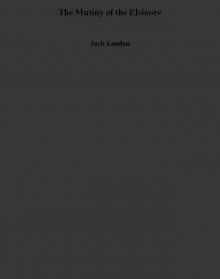 The Mutiny of the Elsinore
The Mutiny of the Elsinore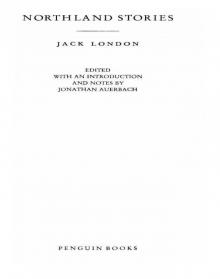 Northland Stories
Northland Stories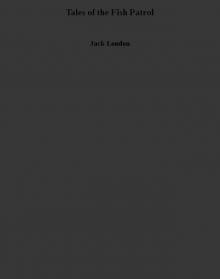 Tales of the Fish Patrol
Tales of the Fish Patrol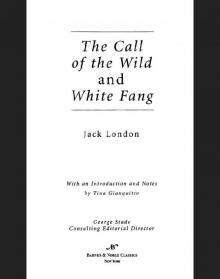 Call of the Wild and White Fang (Barnes & Noble Classics Series)
Call of the Wild and White Fang (Barnes & Noble Classics Series)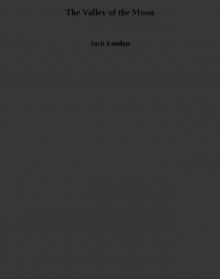 The Valley of the Moon
The Valley of the Moon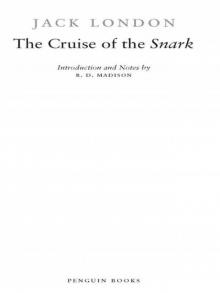 The Cruise of the Snark
The Cruise of the Snark The Game
The Game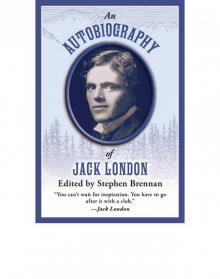 An Autobiography of Jack London
An Autobiography of Jack London